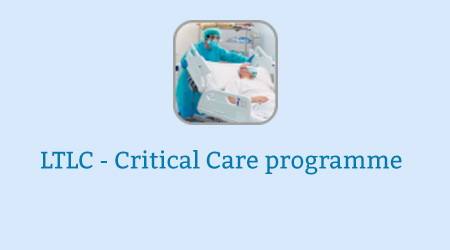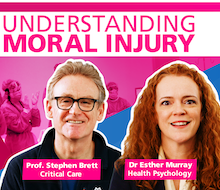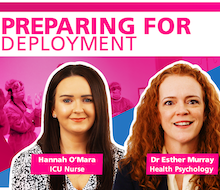COVID-19 Surge 2021 - Rapid Access Resources
To support NHS staff being deployed for the Covid-19 response, the London Transformation and Learning Collaborative have collated key resources to help individuals, educators and systems prepare. We recognise staff are very busy; so these resources are purposely designed to be short and read/watched on the move or the ward. Download, share via social media (or print and post in your department / coffee room / changing room) this interactive PDF on How to access the LTLC resources for redeployment (PDF, 186KB).
A Toolkit for rapid cross-skilling, supporting safe redeployment
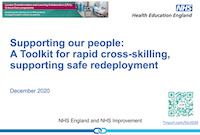 To meet immense pressures and the need to redeploy staff safely across healthcare settings, the LTLC have created a toolkit (PDF, 1448KB) to support interprofessional cross-skilling during rapid redeployment of the workforce.
To meet immense pressures and the need to redeploy staff safely across healthcare settings, the LTLC have created a toolkit (PDF, 1448KB) to support interprofessional cross-skilling during rapid redeployment of the workforce.
The toolkit provides guidance on the resources available on the LTLC website and is packed with hyperlinks and QR codes to take users directly to the core content. It should be used in conjunction with the updated national guidance for workforce management, Advice on Acute Sector Workforce Models During Covid-19 (PDF, 686KB), which was published on 10 December 2020.
360 ICU orientation
- This 360 tour of an ICU bed space is designed to build a shared mental model of the risks and safety considerations at the ICU bedside. It is useful for staff in any role on ICU. It will increase familiarity with equipment and reduce dependence on experienced members of staff
- It works best on a smartphone but can be used on any computer or tablet
- Scan this QR code to use it on your smartphone now
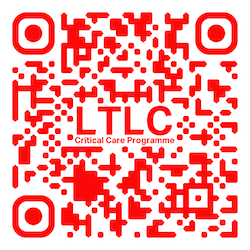
RSC and NRSS Skills Passports
The ‘Skills Passports’ summarise the role essential skills required for a non-registered support staff (NRSS) and registered support clinician (RSC) to function in an intensive care unit (ICU) surge model of care, during the COVID-19 pandemic. They are for NHS staff undertaking NRSS and RSC roles in ICU during the COVID-19 pandemic, and managerial staff overseeing these roles:
- RSC Skills Passport: An RSC may be a junior ICU nurse who has not yet achieved their step 1 competencies in the National Competency Framework, a registered nurse, who works outside of ICU, or a registered (non-nursing) health care professional.
- NRSS Skills Passport: An NRSS may be a Health Care Support Worker, a non-registered member of staff specifically recruited to ICU in this role, or healthcare students who may wish to work on Critical Care Units during the surge as bank staff.
Available digitally and paper RSC Skills Passport (Microsoft Word, 39KB) & NRSS Skills Passport (PDF, 166KB). Note: the digital version also allows users to log their training and reflections, to inform revalidation against professional bodies’ requirements (i.e. the Nursing & Midwifery Council, the General Medical Council or the Health and Care Professions Council).
-
The Skills Passport
The Skills Passport
Knowledge Checker for RSC Skills Passport
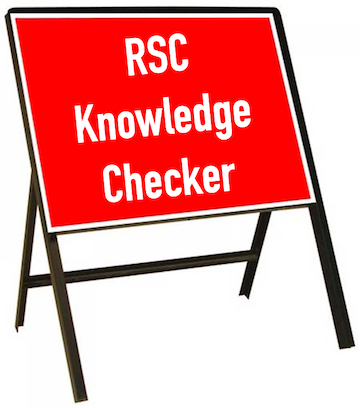 This Knowledge Checker is designed to help registered healthcare professionals preparing for deployment to critical care assess their core knowledge on elements of patient care as covered in the RSC Skills Passport. This knowledge and these skills should allow them to slot into the bedside patient care role in critical care with increased confidence. Each element of the passport is covered in the Knowledge Checker and links are provided to free education resources for each question to support further understanding where needed. (<30 mins to complete, no pass / fail)
This Knowledge Checker is designed to help registered healthcare professionals preparing for deployment to critical care assess their core knowledge on elements of patient care as covered in the RSC Skills Passport. This knowledge and these skills should allow them to slot into the bedside patient care role in critical care with increased confidence. Each element of the passport is covered in the Knowledge Checker and links are provided to free education resources for each question to support further understanding where needed. (<30 mins to complete, no pass / fail)
Critical Care Equipment Guides
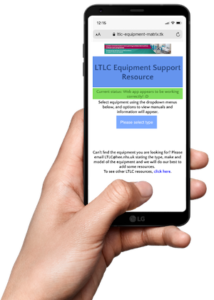 This mobile friendly web app, or downloadable equipment matrix (Microsoft Excel, 92KB), allows the user to rapidly access quick guides, manuals, and training videos for most of the equipment used in Critical Care units in London.
This mobile friendly web app, or downloadable equipment matrix (Microsoft Excel, 92KB), allows the user to rapidly access quick guides, manuals, and training videos for most of the equipment used in Critical Care units in London.
You can search by equipment purpose, make and model to find specific guides that are all free and open access. For example, Ventilator: Hamilton: C3 or Syringe Pump: DeepMed: SP4.
Please note, while these are the most accessible guides available, some may not be from manufacturers, and all should be viewed in the context of local trust or site practice.
Moral injury
- This series of films are designed to stimulate reflection and start conversations about moral injury. This a real-life consequence of the current pandemic situation.
- They were created by the LTLC team and Dr Esther Murray, a health psychologist with a special interest in moral injury.
- Each film has links to reflective questions and further reading resources. The series of films can be accessed via the HEE YouTube channel (some are still in the editing phase, Jan 2021)
”What I especially like in the video is that it does not simply describe moral injury but also talks about how it can be recognised in colleagues, how we might prevent it and what can be done when it occurs.” Critical Care News, Jan 2021
-
Moral Injury
With Dr Esther Murray, Prof Stephen J. Brett & Lucy Broc...
Moral Injury
-
Preparing for deployment
With Dr Esther Murray, Dr Chris Odedun & ICU nurse Hannah ...
Preparing for deployment
Just-in-time training for deployed staff
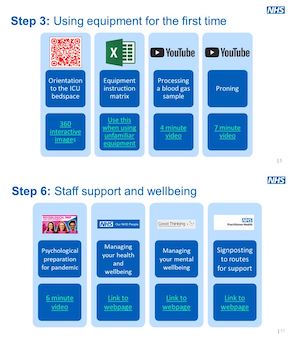 These just-in-time training packages for deployed staff collates COVID-19 response essential skills for staff being (re)deployed, with rapid access links to help them cover the essential skills that may be needed by anyone working outside their normal role in surge. These essential skills have been divided into steps, from how to access COVID-19 specific self-directed learning through to completing a skills passport.
These just-in-time training packages for deployed staff collates COVID-19 response essential skills for staff being (re)deployed, with rapid access links to help them cover the essential skills that may be needed by anyone working outside their normal role in surge. These essential skills have been divided into steps, from how to access COVID-19 specific self-directed learning through to completing a skills passport.
Just-in-time training fundamentals (PDF, 403KB)
Doctor redeployment Just-in-time training (PDF, 431KB)
Managing the COVID surge: 10 Quick Wins for ICUs
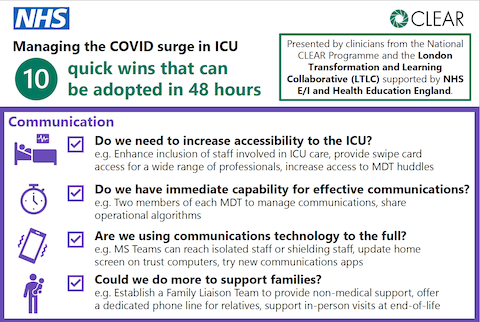
The National CLEAR Programme provides training, data analytics and modelling tools for Clinically-Led workforcE and Activity Redesign (CLEAR). CLEAR participants working in ICUs across 4 London trusts have identified ‘quick wins’ to share with colleagues across the NHS. Whilst these recommendations may seem straightforward and ‘common sense’, our evidence shows that they improve communication, staff wellbeing and patient care.
All of the recommendations can be adopted within 48 hours. The 10 Quick Wins infographic (PDF, 1125KB) provides a summary checklist for discussion in multi-disciplinary planning forums and staff meetings. Download the printer ready version (PDF, 295KB). The 10 Quick Wins slidedeck (PDF, 820KB) provides further details and practical examples.
Paediatric critical care cross-skilling documents
Staff who redeployed from paediatrics to adult critical care in surge 1 identified the learning outcomes they felt they needed to revise to feel confident in the adult environment. A column has been added to the RSC tab of the Skills Matrix called ‘Redeploying paediatric staff areas to update’. Each learning outcome is mapped to resources that are readily available through the LTLC elfh Hub. In addition, as for all staff redeploying, there are key skills covered in both the ‘ICU Generic Skills’ tab and the ‘Covid-19 Generic Skills’ tab such as proning and manual handling’ videos and patient safety resources.
Additional resources have been provided by colleagues from across London:
- Report on supported redeployment of PICU staff to general paediatric ward (Microsoft Word document, 13KB) (GOSH to the Whittington Hospital)
- 17-page guidance document for PICU staff being redeployed to ACC in surge 1 (PDF, 941 KB) (North Thames Paediatric Network)
- Evaluation paper Burnett et al. (2020) (PDF, 383KB) sharing the experiences of 25 redeployed PICU staff during surge 1



